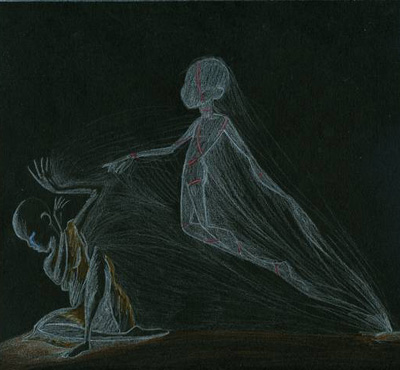The bold premise of Akwaeke Emezi’s debut novel is that it’s primarily narrated – not by Ada, the girl whose coming-of-age tale is at this novel’s centre - but from the perspective of multiple deities and cosmic forces that inhabit her. Ada’s parents are Saul, a Nigerian Catholic doctor, and Saachi, a Malaysian nurse, but Ada is also an ogbanje (child spirit destined to be born and die multiple times) and a child of Ala, an Igbo deity. As such, she doesn’t exist as a singular individual but a plurality of selves encased within one being. Ada’s life is plotted out to us from birth to young adulthood, but rather than following the nuanced emotion of her development we’re given details from the many spirits who inhabit her. The narrative alternates between a collective “we” and others who appear over the course of her life, especially a spirit named Asughara who crucially appears around the time of Ada’s puberty. These entities plot and scheme from within her, influence her actions, strategize to protect her and act as bemused witnesses to Ada’s human concerns. This radical choice in perspective demands that the reader accept their presence as a reality rather than imaginary manifestations of a troubled girl. In doing so, this courageous and inventive novel challenges Western assumptions about identity.
Being so ensconced in the perspectives of these spirits does create a curious distance from the central character. This is exacerbated by frequent references to her as “The Ada” rather than just Ada because they see her as a physical vessel who will only temporarily house them before they move on. Curiously, Ada is both central and secondary within the story as she herself describes: “In many ways, I am not even real. I am not even here.” Ada experiences many issues which other novels would expand upon in great detail such as self-harm, sexual abuse, an eating disorder, suicidal tendencies, bisexuality and being transgendered. However, rather than view these as conditions which need counselling or treatment, the narrative lists them as effects that arise out of Ada’s being inhabited by multiple spirits. This may frustrate readers who aren’t accustomed to considering issues in this way or having them treated so glancingly. Ada’s development is centred more on her being able to accept and coexist with these entities rather than seeking to suppress, ignore or dismiss them. The novel traces how she names these spirits which inhabit her and adopts different identity labels which best suit her because “When you name something, it comes into existence-did you know that? There is strength there, bone-white power injected in a rush, like a trembling drug.”
It’s refreshing how the novel approaches a story of fractured national and racial identity quite differently from novels that deal with similar themes. Where great novels such as “We Need New Names” or “Americanah” focus on the struggle of girls caught between two cultures, Emezi’s novel charts the way in which Ada comes to trust her inner reality rather than adjusting to what the external world wants to impose upon her. The supernatural state of being portrayed in “Freshwater” might be classified as an offspring of magical realism if this were not a term that has become so politically complicated and fraught. In his novel “Augustown”, Kei Miller wrote powerfully about the way this genre has become linked to Western views about supernatural stories that come from cultures deemed by some to be “primitive”. Emezi is forthright and unambiguous about the way she posits Ada’s story. It’s not a question of believing in the supernatural parts of her story, but in respecting the integrity of someone who comes from another culture.
Less convincing is that fact that the novel doesn’t deal with morally complicated aspects of the Nigerian culture that Ada eventually identifies and reconnects with. Given the fact that Nigeria actively legislates against LGBT rights and by the end Ada identifies as transgendered, it feels troublesome that discussions of potential clashes don’t ever arise. Nor is it addressed how female circumcision was sometimes practiced to correct individuals who were thought to be ogbanje. Certainly these laws and practices don’t encompass the beliefs of the entire country and Igbo culture has a distinct tradition of same-sex couples. But nevertheless, it feels like the belief systems that Ada adopts after returning to Nigeria are somewhat idealized without allowing any room to question how they are sometimes practiced. I also took issue with the way Ada’s brief forays with same sex desire are only expressed through the creation of another entity that inhabits her who she names Saint Vincent. When Ada tries to kiss a girl it’s not with her own lips, but this man within her who uses her lips. That same-sex desire can only be realized through the mediation of gendered identities feels oddly regressive for a novel that in many other ways respects the integrity of the individual.
Despite these reservations, the impassioned point of view and inventive writing in “Freshwater” is something very worth celebrating.
This post also appeared on Open Letters Review: https://openlettersreview.com/open-letters-review/freshwater-by-akwaeke-emezi









